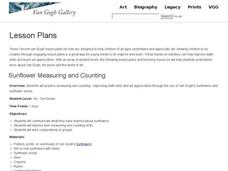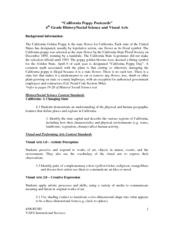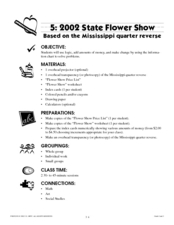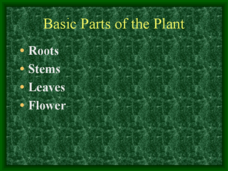Curated OER
Sunflower Measuring and Counting
Youngsters improve their measuring and counting skills using sunflowers. They view pictures painted by Van Gogh. Everyone works in groups to measure sunflowers and record their findings, and they all use sunflower seeds to create...
Curated OER
Our Playground!
First graders observe and explore the playground's environment by walking around the playground, followed by a group discussion of what they observed. They then divide into groups and participate in centers, their brought back together...
Curated OER
Planting a Rainbow Bulletin Board
Students explore a variety of colors and shapes after reading the story, "Planting A Rainbow," by Lois Ehlert. The tracking and reading of labels attached to diagrams form an experience in vocabulary development in this lesson.
Curated OER
Yellow Days: Studying Vincent van Gogh's Painting
Students examine the painting, "Sunflowers," by Vincent van Gogh noting the use of the yellow color, the wiggly lines, and the "globs" of paint used to create the picture. Pictures are painted using van Gogh's image as a model.
Curated OER
The Seeds We Need
Learners apply word analysis skills to recognize new words, identify genres of fiction and nonfiction, and identify important themes and topics. They explore differences in plants, flowers, and vegetables. A book bag full of activities...
Curated OER
Plantable Pulp Cards
What a great way to give a gift that keeps on giving! These homemade plantable cards are not only beautiful, but can be planted into the ground to sprout in the right season. Incorporate this project in a science unit, or for a Mother's...
Primary Resources
Science - The Parts of a Flower
Here is what a PowerPoint presentation should look like! This excellent show lets students know what they will be learning about, takes them through nicely-designed examples, leaves room for discussion questions, has a built-in activity,...
Curated OER
California Poppy Postcards
What a great lesson! Learners discuss California history, including the state flower, the poppy, and then engage in an art activity. For the activity, they learn about value, shading, layering, blending etc. to produce a realistic...
Curated OER
2002 State Flower Show
Here is another State Quarter lesson plan. This one uses the Mississippi State Quarter. Pupils utilize beautifully-designed worksheets embedded in the plan, to practice calculating which combinations of flowers they can afford to buy....
Curated OER
From My Past
Explore the art of Vincent Van Gogh. This presentation shows a large selection of Van Gogh's paintings and gives titles and dates along with some facts about the stages in his life. The slides are attractively designed with clear images...
Biology Junction
Seed Plants: Gymnosperms and Angiosperms
One of the reasons plants found success on land relates to seed development. Scholars learn about many different forms of seeds and how they changed over time. It describes the structure and function of many different types of seeds in...
K12 Reader
Color the Spring Adjectives
Grammar enthusiasts test their adjective knowledge with a learning exercise that challenges them to color each word a specific color based on the type of word that is found inside it. When complete, scholars discover a bright bouquet of...
Curated OER
Spring Springs
Learners identify different parts of a flower and demonstrate their knowledge by creating flowers with those characteristics. They artistically arrange their flowers in a vase they design. Studnets find pictures of parts of a flower.
Curated OER
Flowers and Their Friends
Students study the basic parts of flowering plants. They explore flower characteristics that attract various bird and insect pollinators. Afterward, they represent real or imaginary flowers and pollinators based on their knowledge of...
Curated OER
Fields of Daffodils
Students discuss the characteristics of a community. They discuss their local neighborhood, and brainstorm ways to help others in their community. Using recycled file folders and paint, students create their own daffodils. They discuss...
Curated OER
What Parts of a Plant Do We Eat?
Did you know that tomtoes and cucumbers are actually fruits? Biology or botany beginners read about the function of flowers and fruit and find that some food items commonly called vegetables are, by definition, also fruits! Give learners...
Curated OER
Six Plant Parts
Young scholars create a harvest burrito out of fruit, flowers, roots, stems, and more. In this plants lesson plan, students go out into the garden and identify the 6 plant parts.
Curated OER
Native Beauty
Students plant wild flowers and maintain their garden. In this wild flowers lesson plan, students pick and prepare a gardening site, plant wild flowers, and maintain it everyday.
Curated OER
Flower Power Quiz 1
In this flowers worksheet, students complete a quiz on flowers and things associated with them in the 1960's through 1990's. Students complete 14 short answer questions.
Curated OER
In the Company of Wild Butterflies
Learners discover the life cycle of a butterfly and explain the different stages. For this exploratory lesson students watch a video and create insect art and they will get an opportunity to view live specimens of butterflies.
Curated OER
Introduction to Plant Reproduction
Eight objectives pertaining to plant reproduction are stated and addressed in this presentation. Objectives include defining sexual and asexual reproduction, comparing monocots to dicots, explaining flower types, and more. Some of the...
Curated OER
Basic Parts of the Plant
Beginning botanists learn basic plant structure by viewing this presentation. It is somewhat lifeless because there are no photos, so you will want to display actual plants as you work through the slides. The information, however, is...
Curated OER
Paper Plate Sunflowers
A great way to recall the parts of a flower is to make one. Little learners create sunflowers out of paint and paper plates. They also discuss and label the various parts of their flowers.
Curated OER
Flower Painting/Printmaking
Using old or donated flowers, little learners create flower prints. They discuss the colors found in nature, paint a background, and then create flowers for their pictures by dipping and pressing real flowers onto their paper.

























